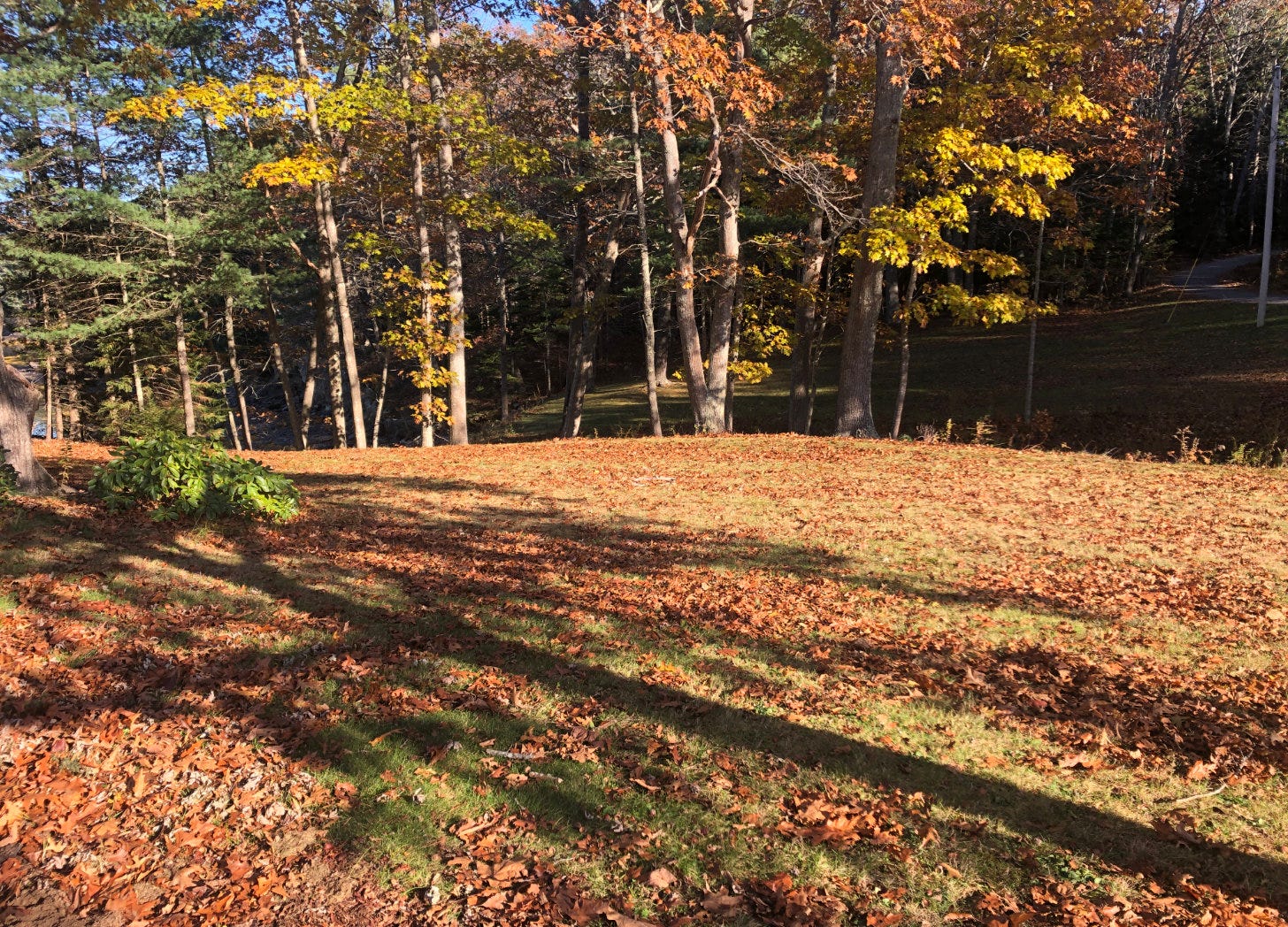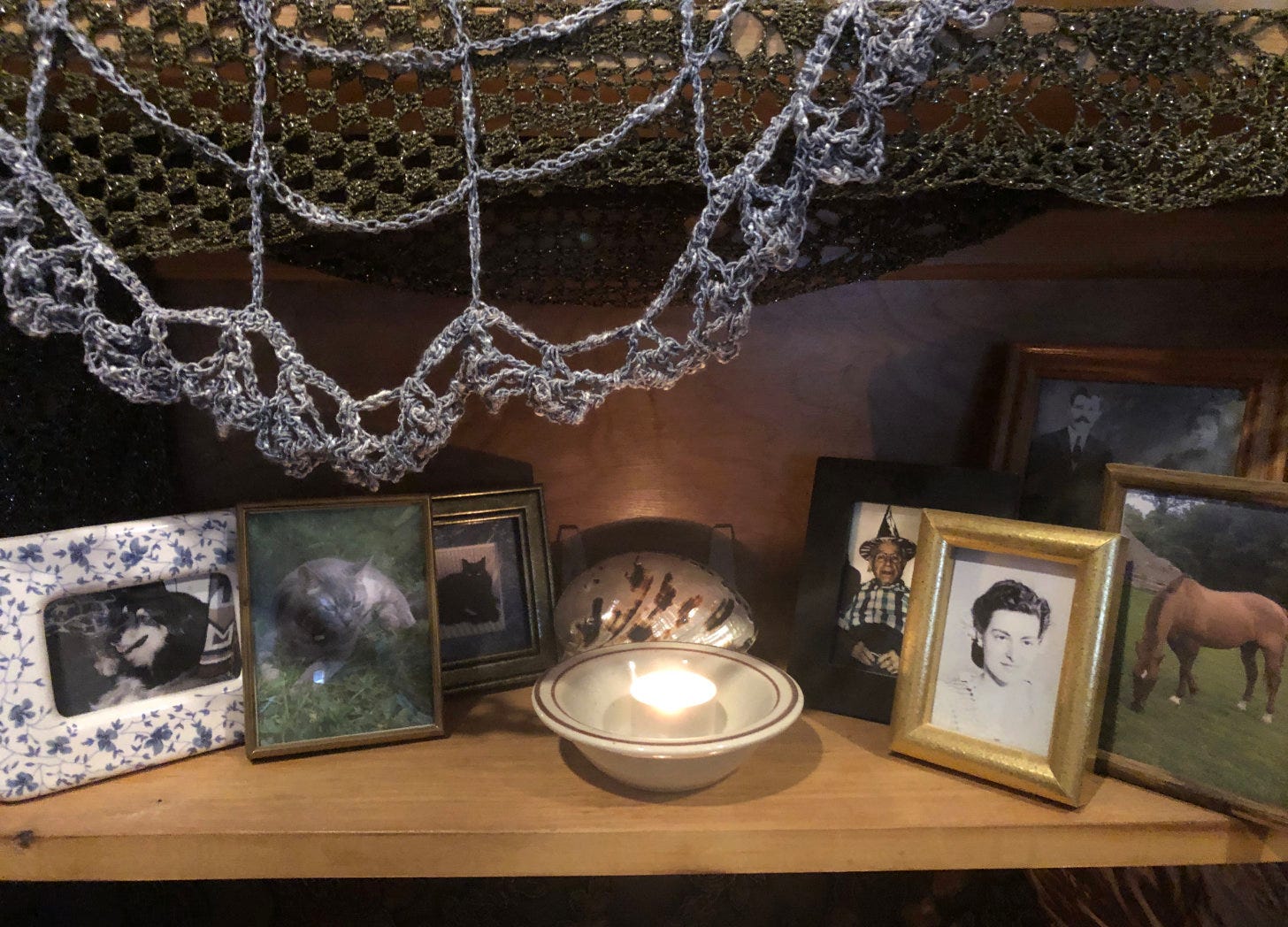Meet the Ancestors
If talking to the gods is strange, talking to your ancestors probably isn't
We are entering the Celtic season of Samhain where we remember the dead. For the northern European traditions, this happens at the winter solstice and is called Jul. I invite you to take some time this month to remember those who have gone before. However there are other reasons to engage with an ancestor practice.
Not everyone finds it easy to communicate with the gods, and even when we talk to them, they don’t always answer. Perhaps that's for the best. Being too god-touched makes being in the embodied world difficult. Driving, for example, demands that one be present in one’s body. Raven Kaldera, a shaman in Massachusetts, describes different ways of being god-ridden. One involves being “locked in the trunk,” a condition that makes it hard to keep the body safe. Raven has a human driver to make sure he gets from place to place and I’m sure that’s a very good thing for other people on the road.
However, it isn’t always necessary to reach out to the gods. We have intermediaries that can often help us with day-to-day troubles.
Our ancestors understand the requirements of embodiment. They’ve been there, and while most of them will never have driven a car – it is, after all, a fairly recent invention – they used sharp tools, and had to get away from danger. They want us to succeed. An ancestor practice is one of the best - and safest - ways for an inexperienced beginning Pagan to connect with the non-embodied world. This is true because our beloved dead care about us in a most personal way.
I’m not asking for paid subscribers but if you like this then perhaps you could…
Or have a look at the books I write under pen name Sabrina Rosen [On Amazon] or subscribe to my fiction blog.
I have a friend who plunged into Paganism not long after we met. One of the things I offer to new Pagans is to drum for them while they Journey to find a power animal. [It’s a shamanic practice.] The search is basic, and involves the visualization of entering the lower world through a hole in the ground to conduct the search. In this particular case, she couldn’t enter the opening. Her deceased sister stood in her way and wouldn’t allow it.
Our dead know what is best for us.
There is more than one type of ancestor but the categories are a matter of convenience. They can blur so don’t get hung up on them. I work with four categories in my practice. Like any relationship, it’s best to begin with saying hello, making an offering, and learning more about them. If you don’t know what a given ancestor might like, something simple such as burned herbs or incense, a libation of clean water or alcohol, or a sprinkling of cornmeal or tobacco is a good start.
The first category I use is ancestors of the blood. These are people whose DNA you carry. They will be the most connected to you and the most likely to be interested in your well-being. But what about adoption? In the Jewish tradition, when one is adopted into the religion, no distinction is made between converts and those born into the tradition. Adoption can be like that. I have in-laws who were adopted and they had no interest in finding those who share their biological DNA. Their spiritual DNA was right where they wanted it.
My second category is ancestors of the heart. These are people who passed and knew you and cared for you, but are not connected by the bonds of immediate family. This includes animals. I have quite a few ancestors of the heart who aren't human, including several cats, a dog, and a horse. Our furry companions may have been closer to us than our parents or siblings [especially if we were missing one or the other], and the relationship is usually far less complicated. The humans on my list include my in-laws, and the Mennonite babysitter who cared for me as a child, and who remained close to mom and myself long after I had graduated high school. Write down cherished memories of such people, or express them in art.
The last category I use is the ancestors of the land. These are the people who dwelt in the place where you live now and retain some presence. The most important ancestors of the land are the native people local to your home. Whether the relationship they had with our ancestors of the blood was bad or good – and there were indeed a few places where it was good – our diseases and cultural bias over-ran theirs, and I believe we owe them, at the very least, the debt of memory. If the person who built your home had a strong attachment, they may still be hanging around and willing to bring your attention to things the house needs. I am fortunate in that I get to spend a lot of time in the house where my family was born and died for 200 years. In our mobile society, my situation is fairly unique. I have one ancestor who, instead of leaving, has stuck around so long that he’s more like a land spirit than an ancestor of the blood. Find out what native tribes lived on the land you now occupy. Who were they? What stories did they tell? What did they honor?
There are many ways to honor your dead. The ritual I attended for several years was large, elaborate, and long, in that everyone who wished to remember a dearly departed was given room to do so at length. Some of my friends do a dumb supper, where one sets the table with an empty place for the dead, food is put on the plate, and the meal is eaten in complete silence. The intent is to hear any messages the dead have for the living. My version of Samhain is a potluck supper where the guests bring some food that an ancestor would have eaten, and a story - or two - about them to tell at the dinner table.
That which is remembered, lives. In the feed and on the message board for subscribers, I’ll be inviting you to remember some of your beloved dead for the next month.
If you’re curious about Paganism/Heathenism/Wicca, please feel free to message me and I’ll be happy to answer questions.
Selina Rifkin, M.S. [Nutrition], LMT, has been Pagan since she was 14 [which was a long time ago] and been to Hades in a handbasket. More than once. This has given her some opinions. She has direct communication with her gods and they’ve always given her answers when she asks. [One does have to ask.] Like most of her generation [X] she’s okay with snark. Most days she tries for good writing. But the snark, and side comments creep in. Be warned.







I have had Pagan friends so much of what you write about is familiar to me. 💕 Honouring ancestors, loved ones and those associated with the physical space and land…this speaks to me. We keep a wall of loved ones’ photos (including cats who have left us) to remind us of the continuum of life.
Thank you for this reminder that we are a part of everyone in our lives. Excellent article.💕